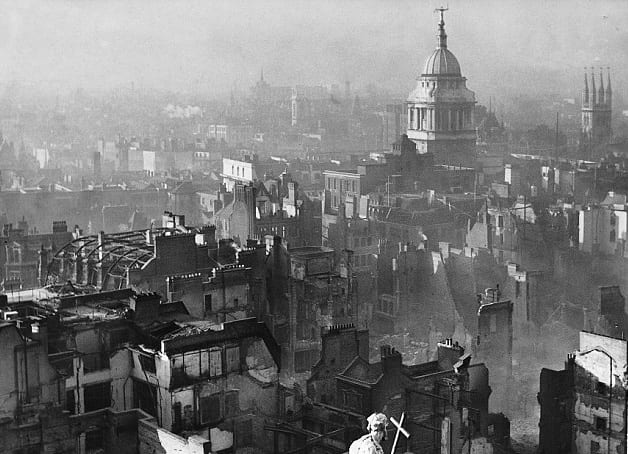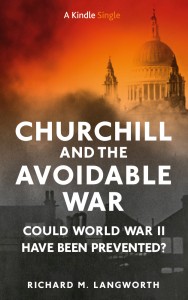
Grand Alliance: A Way Out of the Second World War?
Question:
“Professor John Charmley says in a podcast that Neville Chamberlain believed a prewar grand alliance against Hitler was not feasible. He was referring to alliance between the UK and France and the United States and USSR. Do you agree?”
Answer:
As Mona Lisa Vito (Marisa Tomei) tells the District Attorney (Lane Smith) in “My Cousin Vinny” (1992), “that’s a B.S. question.”
(To voir dire Miss Vito on “general automotive knowledge” the D.A. had demanded the ignition timing of “a 1955 Chevrolet 327 V-8.” (Readers less mechanically inclined than Miss Vito may enjoy her devastating two-minute rebuttal to this “trick question.”)
Thirty years ago Professor Charmley and I engaged in a grand harangue over his highly readable critique, Churchill: The End of Glory. The argument was over whether Churchill was right to prosecute the Hitler war after mid-1940. Neither side gave an inch, but John engaged with gentlemanly verve and collegiality that I admired, and tried to reciprocate. Afterward he invited me to lunch at his club, where I promised to order the most expensive champagne. Alas we were never able to make it work.
I am sure Dr. Charmley correctly represents Chamberlain’s belief that alliance with Russia or the Americans was not feasible. But never mind 1940. Why is the question, “would alliance have prevented WW2” like the question about a 1955 Chevy 327? Because as Mona Lisa Vito says, “nobody could answer that question.” It is unanswerable.
 The subject of alliance between the Anglo-French and Russians, and then the Americans, is considered in my 2015 monograph, Churchill and the Avoidable War. (For a review by Professor Manfred Weidhorn, click here.) Relevant to your question are two chapters….
The subject of alliance between the Anglo-French and Russians, and then the Americans, is considered in my 2015 monograph, Churchill and the Avoidable War. (For a review by Professor Manfred Weidhorn, click here.) Relevant to your question are two chapters….
Alliance with Ivan
Chapter 6, “Favourable Reference to the Devil,” considers the notion, strongly pushed by Churchill, of a Soviet alliance. These excerpts may be pertinent. (Endnotes are in the book):
From the time Hitler marched on the Rhineland, Churchill had pondered Anglo-Russian cooperation. The historian Donald Cameron Watt wrote: “He fell into the clutches of Ivan Maisky, the Soviet ambassador in London…writing to Viscount Cecil of the need to “organise a European mass and, perhaps, a world mass which will confront…the heavily armed unmoral dictatorships.”
Maisky was clever and worldly, practised in English ways…. But saying Churchill fell into his clutches is very wide of the mark. Churchill loathed and feared the Soviet Union, and it was a huge decision to court Maisky. Yet Churchill could add and subtract, and he needed the help. He acted for big reasons, and he explained them. In the event, his forebodings about the USSR would be proven entirely correct.
Churchill, a private Member of Parliament without office, was able to play only a background role as Britain considered a Russian arrangement. But it is incorrect to believe he did not call for one until 1938. He had many conversations with principals, including Nazis, which he duly forwarded to the Foreign Office.
Up until Munich, Churchill’s stand on Russia was closer to that of his party than has been generally recognized. After Munich, he correctly concluded that the only way left to prevent war was to revive the Triple Entente that had faced Germany in World War I. In view of Stalin’s obvious ambitions in eastern Europe, the question is whether that would have prevented a world conflagration: an issue we shall now consider.
Alliance and America
Chapter 7, “Lost Best Hope,” considers the chance of alliance with America. In this case Chamberlain was even more disdainful:
Churchill made his views about America known as early as 1935: “We must keep in the closest touch with the United States of America….” In 1937, Churchill was heartened to hear of President Roosevelt’s “Quarantine Speech” in Chicago. “A reign of terror and international lawlessness,” FDR said, threatened “the very foundations of civilization.” He proposed economic pressure on the aggressor nations. Churchill responded that these were “exactly the same ideas that are in our minds, and I have no doubt that it will be cordially welcomed by Mr. Chamberlain.”
They were not: On 11 January 1938, Roosevelt telegraphed Chamberlain proposing to invite representatives of Germany, Britain, France and Italy to Washington in the hopes of mediating an easement of affairs, or at least taking part in discussions. Before doing so, he wrote, he wished to consult with the Chamberlain government. Not the French or German government—the British government. This was not alliance, but it certainly was a suggestion that Britain and America might work together.
It was a golden opportunity, but Chamberlain was in a belligerent mood. In December, after Japan attacked British and American gunboats on the Yangtze, he had proposed a concerted Anglo-American response including a joint naval task force, Roosevelt had settled for a Japanese apology. The Americans, Chamberlain complained, “are incredibly slow and have missed innumerable busses….I do wish the Japs would beat up an American or two!” Japan fulfilled his wish four years later at Pearl Harbor.
Back to the Unanswerable Question
Chamberlain’s rebuff of Roosevelt ended the last frail chance to save the world from catastrophe. Churchill was on holiday in the South of France during this episode, and could not have known of it at the time. But his memoirs were censorious:
That Mr. Chamberlain, with his limited outlook and inexperience of the European scene, should have possessed the self-sufficiency to wave away the proffered hand stretched out across the Atlantic leaves one, even at this date, breathless with amazement. The lack of all sense of proportion, and even of self-preservation, which this episode reveals in an upright, competent, well-meaning man, charged with the destinies of our country and all who depended upon it, is appalling. One cannot today even reconstruct the state of mind which would render such gestures possible.
So the answer to your question, was alliance with Russia or America feasible, is impossible to supply. Neither option appealed to Mr. Chamberlain. And contrary to many opinions, he was a very astute man, trying “according to his lights,” as Churchill said, to avoid war.
Under the right leadership, perhaps one alliance or the other might have worked. But that required extraordinary vision—the persuasiveness, mindset and savoir faire Churchill might have brought to the task.
Was it possible? Yes, but with great difficulty. I welcome reader opinions.






